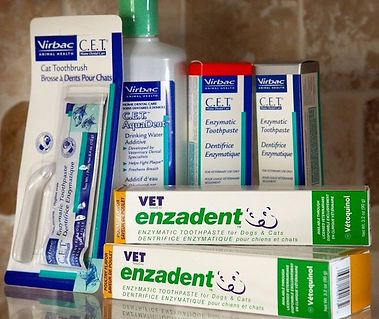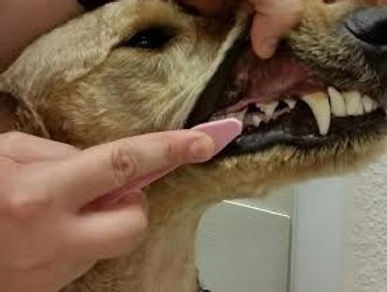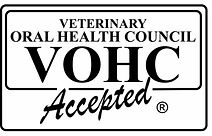
At Home Dental Care
To minimize the need for professional dental scaling procedures and to maintain optimal oral health, AVDC recommends daily dental home care from an early age in dogs and cats. There are several home care options from which you can choose from. You should choose something that both you and your pet are comfortable with and are able to keep the effort up with year round.
Brushing
Brushing Teeth is the gold standard of dental care. You should brush teeth at least 3 times a week, with daily brushing prefered. Almost all dogs will eventually accept brushing; cats are trickier and even though brushing is considered the gold standard a different home care option may be best. The key to success is to be patient and gradual in your approach. A dog that resists brushing may have painful areas in the mouth that need to be addressed.


Avoid human toothpastes. Pet approved toothpastes come in multiple favors, such as mint, poultry, seafood, etc.; so find one that fits for your pet's taste. You can use abrasive gauze, finger brushes, or toothbrushes designed soft and angled to assist in brushing the back teeth.
Diet
Several “dental diets” have been shown to be of benefit in decreasing dental disease. Desert View Animal Hospital recommends Hill's Prescription Diet t/d, a VOHC approved diet, for either your dog or cat.
Ideally it should be their primary diet if there are no other health issues as it allows for the greatest efficacy. However, you can just add it to their diet, or give the food like a treat.

The video below shows a screwdriver test done on t/d kibble vs other brands. It is a great visual of how it removes tartar from your pet's teeth.
Chews
Rawhide products and chew treats can be helpful if chewed daily, and some even contain anti-tartar ingredients. At NSAH we carry:

-
CET Enzymatic Chews for dogs are made from beefhide with an abrasive texture that works with the dog's chewing action to loosen tartar and control plaque. They come in sizes small to extra-large (digestible in the stomach if swallowed and doesn’t break teeth)
-
CET Chews for cats helps keep breath fresh and teeth clean. Freeze-dried fish component contributes abrasive texture that helps clean teeth (comes in poultry or fish flavors)
-
Veggie Dents for dogs are vegetable based chews so pets who are not the biggest of chewers don’t have to spend as long chewing on these.
*Any product that has a VOHC (Veterinary Oral Health Council) seal is a good dental home care product to use.

This organization tests the safety and effectiveness of dental products, and products are independently studied by boarded veterinary dentists. Please check out their website for a full list of great dental products. https://vohc.org/accepted-products/
*Another rule of thumb is, if it can bend or crumble easily, it is safe for the pet to chew on.
*Nylabones, bully sticks, elk antlers, bones, and ice cubes can break teeth easily, which can lead to fractured teeth and potentially require immediate dental intervention.
